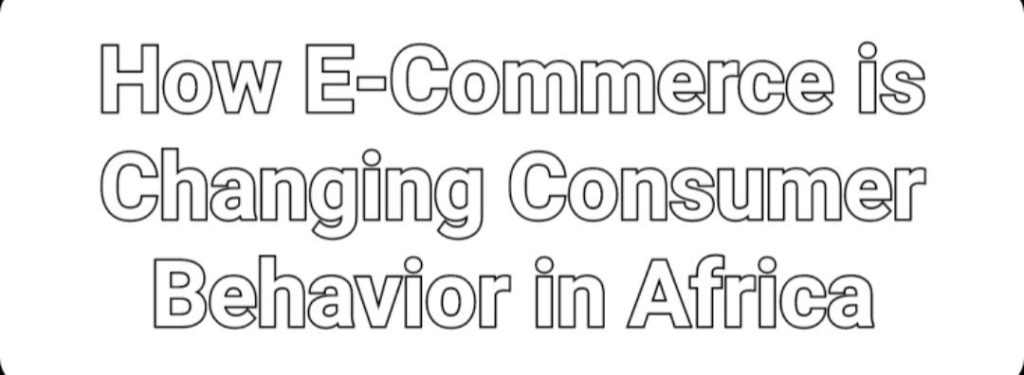How E-Commerce is Changing Consumer Behavior in Africa
The rise of e-commerce is transforming the way people shop, connect, and do business across the globe. In Africa, this digital revolution is reshaping consumer behavior in profound ways, driven by increasing internet penetration, mobile technology, and a growing middle class. As online shopping becomes more accessible and convenient, African consumers are embracing new habits, preferences, and expectations. Here’s how e-commerce is changing the game in Africa.

1. The Mobile Commerce Boom
Africa is a mobile-first continent. With over 650 million mobile users and affordable smartphones becoming widely available, mobile commerce (m-commerce) has taken center stage. Platforms like Jumia, Konga, and Takealot have optimized their services for mobile users, allowing consumers to shop on-the-go. This shift has made shopping more accessible, especially in rural areas where traditional retail infrastructure is limited. Consumers are now accustomed to browsing, comparing prices, and making purchases with just a few taps on their phones.
2. Increased Access to a Wider Range of Products
E-commerce has broken down geographical barriers, giving African consumers access to products that were previously unavailable or hard to find. From international fashion brands to specialized electronics, online marketplaces are offering a diverse range of goods. This has not only expanded consumer choice but also raised expectations for quality and variety. Consumers are no longer limited to local markets; they can now shop globally from the comfort of their homes.
3. The Rise of Convenience and Time-Saving Shopping
Busy urban lifestyles and traffic congestion in major African cities have made convenience a top priority for consumers. E-commerce platforms are catering to this demand by offering fast delivery options, easy return policies, and 24/7 shopping availability. Services like same-day delivery and click-and-collect are becoming increasingly popular, especially in cities like Lagos, Nairobi, and Johannesburg. This shift is encouraging consumers to prioritize efficiency and convenience over traditional in-store shopping.
4. Trust in Online Payments is Growing
One of the initial challenges for e-commerce in Africa was the lack of trust in online payment systems. However, the rise of secure digital payment solutions like M-Pesa, PayPal, and Flutterwave has changed the game. Mobile money, in particular, has been a game-changer, enabling millions of unbanked Africans to participate in the digital economy. As trust in online transactions grows, more consumers are willing to make purchases online, further fueling the e-commerce boom.
5. Social Commerce is on the Rise
Social media platforms like Facebook, Instagram, and WhatsApp are playing a significant role in shaping consumer behavior in Africa. Many small businesses and entrepreneurs are leveraging these platforms to reach customers, showcase products, and facilitate transactions. This "social commerce" trend is particularly popular among younger consumers who value personalized interactions and recommendations from trusted sellers. It’s not uncommon to see entire businesses run exclusively through WhatsApp groups or Instagram pages.
6. Price Sensitivity and Bargain Hunting
African consumers are known for being price-sensitive, and e-commerce platforms are capitalizing on this by offering discounts, flash sales, and loyalty programs. Consumers are increasingly using online tools to compare prices and hunt for the best deals. This behavior is driving competition among retailers, pushing them to offer more competitive pricing and value-added services.
7. Changing Perceptions of Luxury and Brand Consciousness
As e-commerce exposes African consumers to global trends and brands, there is a growing appetite for luxury goods and branded products. Platforms like MallforAfrica and Afrikrea are catering to this demand by offering high-end fashion, beauty products, and accessories. This shift is particularly evident among the continent’s growing middle class, who are increasingly brand-conscious and willing to invest in quality products.
8. Sustainability and Ethical Shopping
While still in its early stages, there is a growing awareness of sustainability and ethical consumption among African consumers. E-commerce platforms are beginning to offer eco-friendly products and promote ethical brands. This trend is particularly strong among younger, more socially conscious shoppers who want their purchases to align with their values.
9. The Role of Logistics and Last-Mile Delivery
The success of e-commerce in Africa hinges on efficient logistics and last-mile delivery solutions. Companies are investing heavily in innovative delivery models, including drones, motorbikes, and pickup stations, to overcome infrastructure challenges. As delivery networks improve, consumers are becoming more confident in online shopping, knowing that their purchases will arrive on time and in good condition.
10. Empowering Local Entrepreneurs
E-commerce is not just changing how Africans shop; it’s also creating opportunities for local entrepreneurs and small businesses. Platforms like Etsy-inspired Afrikrea and Alibaba-like Copia are empowering artisans, farmers, and SMEs to reach a wider audience. This is fostering a culture of entrepreneurship and innovation, while also giving consumers access to unique, locally-made products.
Conclusion
E-commerce is revolutionizing consumer behavior in Africa, offering unprecedented access, convenience, and choice. As technology continues to evolve and infrastructure improves, the e-commerce landscape will only grow more dynamic. For businesses, understanding these shifting behaviors is key to staying competitive in this rapidly changing market. For consumers, the digital shopping revolution is empowering them to make smarter, more informed decisions, and shaping a new era of retail in Africa.
The future of commerce in Africa is digital, and the transformation is just beginning. Whether you’re a consumer, entrepreneur, or business leader, now is the time to embrace the opportunities that e-commerce brings to the continent.
What are your thoughts on the rise of e-commerce in Africa? Share your experiences and insights in the comments below!
![IMG_20250312_021101_773[1] How E-Commerce is Changing Consumer Behavior in Africa](https://www.saalime.com/wp-content/uploads/2025/03/IMG_20250312_021101_7731.jpg)
Good https://lc.cx/xjXBQT
Awesome https://lc.cx/xjXBQT
Awesome https://rb.gy/4gq2o4
Awesome https://is.gd/N1ikS2